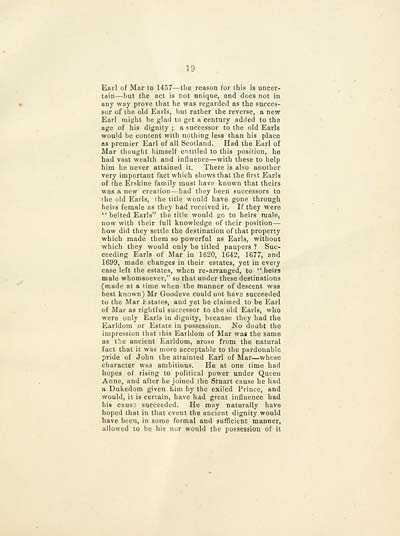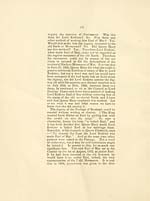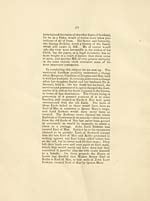Paper on the Mar peerage
(27) Page 19
Download files
Complete book:
Individual page:
Thumbnail gallery: Grid view | List view

19
Earl of Mar lo 1457 — the reason for this is uncer-
tain — but the act is not unique, and does not in
any way prove that he was regarded as the succes-
sor of the old Earls, but rather the reverse, a new
Earl might be glad to get a century added to the
age of his dignity ; a successor to the old Earls
would be content with nothing less than his place
as premier Earl of all Scotland. Had the Earl of
Mar thought himself entitled to this position, he
had vast wealth and influence — with these to help
him he never attained it. There is also another
very important fact which shows that the first Earls
of the Erskine family must have known that theirs
was a new creation — had they been successors to
the old Earls, the title would have gone through
heirs female as they had received it. If they were
" belted Earls" the title would go to heirs male,
now with their full knowledge of their position —
how did they settle the destination of that property
which made them so powerful as Earls, without
which they would only be titled paupers ? Suc-
ceeding Earls of Mar in 1620, 1642, 1677, and
1699, made changes in their estates, yet in every
case left the estates, when re-arranged, to "heirs
male whomsoever," so that under these destinations
(made at a time when the manner of descent was
best known) Mr Goodeve could not have succeeded
to the Mar Estates, and yet he claimed to be Earl
of Mar as rightful successor to tbe old Earls, who
were only Earls in dignity, because they had the
Earldom or Estate in possession. No doubt the
impression that this Earldom of Mar was the same
as the ancient Earldom, arose from the natural
fact that it was more acceptable to the pardonable
pride of John the attainted Earl of Mar — whose
character was ambitious. He at one time had
hopes of rising to political power under Queen
Anne, and after he joined the Stuart cause he had
a Dukedom given him by the exiled Prince, and
would, it is certain, have had great influence had
his cause succeeded. He may naturally have
hoped that in that event the ancient dignity would
have been, in some formal and sufficient manner,
allowed to be his nor would the possession of it
Earl of Mar lo 1457 — the reason for this is uncer-
tain — but the act is not unique, and does not in
any way prove that he was regarded as the succes-
sor of the old Earls, but rather the reverse, a new
Earl might be glad to get a century added to the
age of his dignity ; a successor to the old Earls
would be content with nothing less than his place
as premier Earl of all Scotland. Had the Earl of
Mar thought himself entitled to this position, he
had vast wealth and influence — with these to help
him he never attained it. There is also another
very important fact which shows that the first Earls
of the Erskine family must have known that theirs
was a new creation — had they been successors to
the old Earls, the title would have gone through
heirs female as they had received it. If they were
" belted Earls" the title would go to heirs male,
now with their full knowledge of their position —
how did they settle the destination of that property
which made them so powerful as Earls, without
which they would only be titled paupers ? Suc-
ceeding Earls of Mar in 1620, 1642, 1677, and
1699, made changes in their estates, yet in every
case left the estates, when re-arranged, to "heirs
male whomsoever," so that under these destinations
(made at a time when the manner of descent was
best known) Mr Goodeve could not have succeeded
to the Mar Estates, and yet he claimed to be Earl
of Mar as rightful successor to tbe old Earls, who
were only Earls in dignity, because they had the
Earldom or Estate in possession. No doubt the
impression that this Earldom of Mar was the same
as the ancient Earldom, arose from the natural
fact that it was more acceptable to the pardonable
pride of John the attainted Earl of Mar — whose
character was ambitious. He at one time had
hopes of rising to political power under Queen
Anne, and after he joined the Stuart cause he had
a Dukedom given him by the exiled Prince, and
would, it is certain, have had great influence had
his cause succeeded. He may naturally have
hoped that in that event the ancient dignity would
have been, in some formal and sufficient manner,
allowed to be his nor would the possession of it
Set display mode to:
![]() Universal Viewer |
Universal Viewer | ![]() Mirador |
Large image | Transcription
Mirador |
Large image | Transcription
Images and transcriptions on this page, including medium image downloads, may be used under the Creative Commons Attribution 4.0 International Licence unless otherwise stated. ![]()
| Histories of Scottish families > Paper on the Mar peerage > (27) Page 19 |
|---|
| Permanent URL | https://digital.nls.uk/94944134 |
|---|
| Description | A selection of almost 400 printed items relating to the history of Scottish families, mostly dating from the 19th and early 20th centuries. Includes memoirs, genealogies and clan histories, with a few produced by emigrant families. The earliest family history goes back to AD 916. |
|---|

